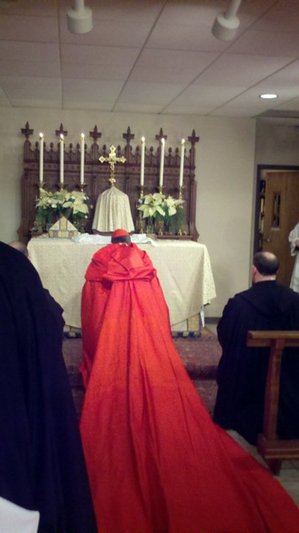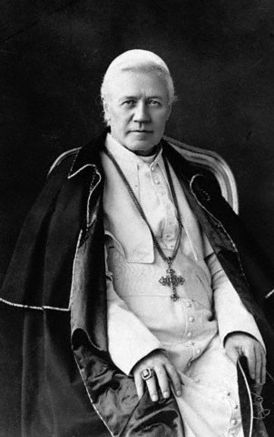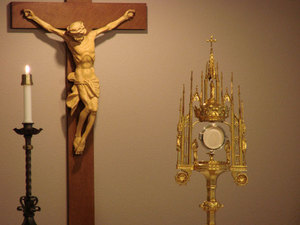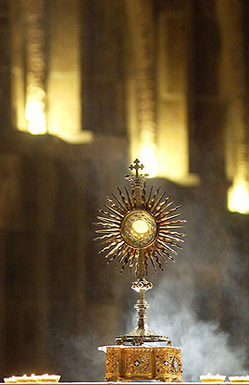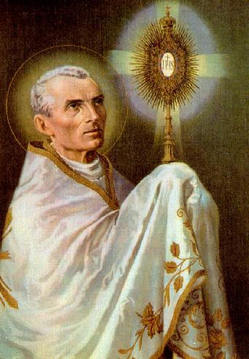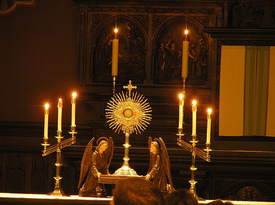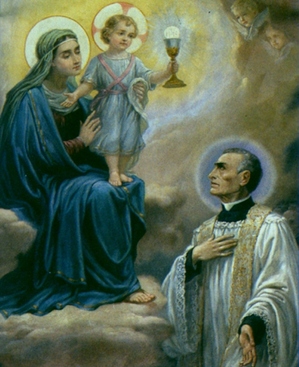 Gracious God of our ancestors, You led Peter Julian Eymard, like Jacob in times past, on a journey of faith. Under the guidance of Your gentle Spirit, Peter Julian discovered the gift of love in the Eucharist which Your Son Jesus offered for the hungers of humanity. Grant that we may celebrate this mystery worthily, adore it profoundly, and proclaim it prophetically for Your greater glory. Amen.
Gracious God of our ancestors, You led Peter Julian Eymard, like Jacob in times past, on a journey of faith. Under the guidance of Your gentle Spirit, Peter Julian discovered the gift of love in the Eucharist which Your Son Jesus offered for the hungers of humanity. Grant that we may celebrate this mystery worthily, adore it profoundly, and proclaim it prophetically for Your greater glory. Amen.
Tag: Blessed Sacrament
Cardinal Raymond Leo Burke visits the St Louis Oratory of Sts Gregory & Augustine
Saint Pius X, pope
In Pope Saint Pius X we have an ardent supporter and leader in devotion to the Christ Lord known to us in the adoration of the Blessed Sacrament. Today, take the opportunity to spend some time, even if it is 5 minutes, in front of the Blessed Sacrament saying nothing to the Lord; just being there in friendship and humble adoration is enough. And ask Saint Pius X to beg the Holy Spirit once again to place in our hearts a fervent love for the Lord in the Eucharist and the grace to live in communio with the Trinity and our neighbor.
Saint Pius wrote of the place Eucharistic worship in our Catholic lives:
Wherefore, works of this kind which have been already set on foot must be ever more zealously promoted; old undertakings must be revived wherever perchance they may have fallen into decay; for instance,
Confraternities of the holy Eucharist, intercessory prayers before the blessed Sacrament exposed for the veneration of the faithful, solemn processions, devout visits to God’s tabernacle, and other holy and salutary practices of some kind; nothing must be omitted which a prudent piety may suggest as suitable.
But the chief aim of our efforts must be that the frequent reception of the Eucharist may be everywhere revived among Catholic peoples. For this is the lesson which is taught us by the example, already referred to, of the primitive Church, by the decrees of Councils, by the authority of the Fathers and of the holy men in all ages. For the soul, like the body, needs frequent nourishment; and the holy Eucharist provides that food which is best adapted to the support of its life.
Accordingly all hostile prejudices, those vain fears to which so many yield, and their specious excuses from abstaining from the Eucharist, must be resolutely put aside; for there is question here of a gift than which none other can be more serviceable to the faithful people, either for the redeeming of time from the tyranny of anxious cares concerning perishable things, or for the renewal of the Christian spirit and perseverance therein. To this end the exhortations and example of all those who occupy a prominent position will powerfully contribute, but most especially the resourceful and diligent zeal of the clergy.
Pope Saint Pius X, Mirae Caritatis (1902)
Christ abides with us forever in the Eucharist
Just as Holy Thursday and then Corpus Christi focuses our attention on the beauty of Christ’s fulfillment of His promise to remain with us –in the Holy Eucharist– so every Thursday ought to be a day of special prayer (time spent in adoration, Mass, confession of sins, reflection using the works of “eucharistic saints”). And this is the point of this blog: sharing in Communio lived with Christ in the Church among all people. But to the point here, I think any time spent with the Blessed Sacrament “touches eternity, highlighting the relationship between the Eucharistic banquet (the Mass) and the eschatological banquet in the Father’s Kingdom (heaven)” (GIRM 281).
Understanding Adoration of the Blessed Sacrament
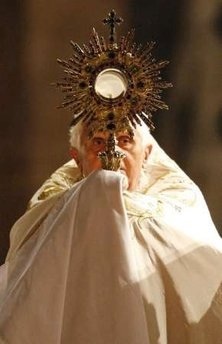 Periodically people ask about the practice of Adoration of the Blessed Sacrament. I typically find the questions interesting because it seems like we have forgotten the reasons why we adore the eucharistic Presence of Jesus Christ and this experience of eucharistic adoration is key for every Catholic and for every parish, school, hospital, convent, abbey, etc.
Periodically people ask about the practice of Adoration of the Blessed Sacrament. I typically find the questions interesting because it seems like we have forgotten the reasons why we adore the eucharistic Presence of Jesus Christ and this experience of eucharistic adoration is key for every Catholic and for every parish, school, hospital, convent, abbey, etc.
of the Blessed Sacrament we should go to the liturgical book called Holy
Communion and Worship of the Eucharist Outside Mass. While it does not provide
details about what ought or ought not be done at Adoration, it does provide a
liturgical theology by which we follow. There it says that
the Holy Eucharist is intended to acknowledge Christ’s marvelous presence in
the sacrament. Exposition invites us to the spiritual union with him that
culminates in sacramental communion. Thus it fosters very well the worship
which is due to Christ in spirit and in truth. This kind of exposition
must clearly express the cult of the blessed sacrament in its relationship to
the Mass. The plan of the exposition should carefully avoid anything
which might somehow obscure the principal desire of Christ in instituting the
Eucharist, namely, to be with us as food, medicine, and comfort” (n.82).
we can reason that devotions, songs, prayers, etc., ought to be consistent
with what is given in this book.
Liturgy: Principles and Guidelines does offer examples of what is
consistent with the purposes of Eucharistic adoration. It says:
faithful should be encouraged to read the Scriptures during these periods of
adoration, since they afford an unrivalled source of prayer. Suitable
hymns and canticles based on those of the Liturgy of the Hours and the
liturgical seasons could also be encouraged, as well as periods of silent
prayer and reflection. Gradually, the faithful should be encouraged not
to do other devotional exercises during exposition of the Blessed Sacrament.
Given the close relationship between Christ and Our Lady, the rosary can
always be of assistance in giving prayer a Christological orientation, since it
contains meditation of the Incarnation and the Redemption (n.165).
evaluate our devotional practices during Adoration of the Blessed Sacrament.
Eucharistic adoration returns to Boston
After a 40-year absence, the practice of perpetual adoration
of the Blessed Sacrament has returned to the Archdiocese of Boston. This is
another positive response to Pope Benedict’s calling for a Year of the Priest
and a desire to intimately know the Lord.
In Ecclesia de Eucharistia, Pope John Paul told us that:
It is pleasant to spend time with him [Christ], to lie close
to his breast like the Beloved Disciple (cf. Jn 13:25) and to feel the infinite
love present in his heart. If in our time Christians must be distinguished
above all by the “art of prayer”, how can we not feel a renewed need to spend
time in spiritual converse, in silent adoration, in heartfelt love before
Christ present in the Most Holy Sacrament? How often, dear brother and sisters,
have I experienced this, and drawn from it strength, consolation and
support! This practice, repeatedly praised and recommended by the
Magisterium, is supported by the example of many saints. Particularly
outstanding in this regard was Saint Alphonsus Liguori, who wrote: “Of all
devotions, that of adoring Jesus in the Blessed Sacrament is the greatest after
the sacraments, the one dearest to God and the one most helpful to us”. The
Eucharist is a priceless treasure: by not only celebrating it but also by
praying before it outside of Mass we are enabled to make contact with the very
wellspring of grace. A Christian community desirous of contemplating the face
of Christ in the spirit which I proposed in the Apostolic Letters Novo
Millennio Ineunte and Rosarium Virginis Mariae cannot fail also to develop this
aspect of Eucharistic worship, which prolongs and increases the fruits of our
communion in the body and blood of the Lord.
In Mane Nobiscum Domine we read: “Our faith in the God
who took flesh in order to become our companion along the way needs to be
everywhere proclaimed, especially in our streets and homes, as an expression of
our grateful love and as an inexhaustible source of blessings.” So the
liturgical practice of adoration of the Blessed Sacrament
deepens the heart’s desire “to cultivate a lively awareness of Christ’s
real presence” (18).
Get the point? Adoration of the Eucharistic face of the Lord awakens in us something new, something beautiful.
Officially Boston’s Eucharistic adoration begins with the Sacrifice of the Mass on
August 15 celebrated by Cardinal Sean O’Malley, OFM Cap.
Visit website for the Saint Clement Shrine
“O taste and see the goodness of the Lord.” (Psalm 34)
Saint Peter Julian Eymard
A list of resources on The Apostle of the Blessed Sacrament
Thursday: a fitting day for adoration of the Blessed Sacrament
In some places it’s now catching-on that Thursday is a
fitting day for Eucharistic adoration with the intention of reparation, perhaps
replacing Fridays if one had to make a choice or either-or. I tend to think
that Thursday is a more apt for Eucharistic adoration on a stable basis in one’s
life and perhaps in parish life since as Catholics our center is Eucharistic and
the identification the Church makes with events that happened on Holy Thursdays
and Corpus Christi. Some theologians and spiritual writers today are advocating
this move for just this reason: Do this in memory of me. Whatever the case is,
adoration of the Blessed Sacrament is clearly a return to “the Cenacle, there
to relive in adoration and joy the gift and mystery of the Most Holy
Eucharist.”
Thinking about what Pope Benedict XVI has said regarding the
Lord’s Supper, “the Church commemorates the institution of the Eucharist, the
ministerial priesthood and the new commandment of charity, left by Jesus to his
disciples.” In another place he said that there is
a “…renewed invitation to render thanks to God for the supreme gift of the
Eucharist, to be received with devotion and to be adored with lively faith.
Because of this, the Church encourages, after the celebration of Holy Mass,
watching in the presence of the Most Holy Sacrament, recalling the sad hour that
Jesus passed in solitude and prayer in Gethsemane, before being arrested and
then being condemned to death.” We therefore adore Jesus in the Blessed Sacrament, either following Mass or at another time to live in the graces of what happened at Mass. Adoration of the Blessed Sacrament extends the graces of the Mass even after Mass has ended.
What better day than to work on this invitation to live in a
spirit of renewal with the Eucharist, the ministerial priesthood and the
theology of the Mass. The gift of sanctification (holiness) promised us by the
Lord is made real in the bond we have with the Eucharistic Lord. Our lives
depend on it because a strong Eucharistic spirituality centers our heart in the
heart of the Church.
Epiphany Novena for priests
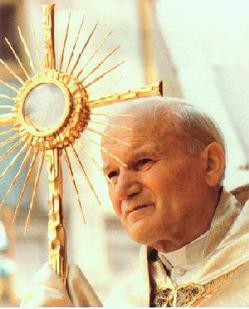 Little more than a year my friend Fr. Mark at Vultus Christi initiated a plan of prayer for the priesthood, particularly in reparation for sins committed by priests. This plan of prayer was inspired by a letter from Cardinal Claudio Hummes, OFM to the world’s bishops encouraging them to designate people, including priests, whose “ministry” it would be to pray for the priesthood in the wake of the sex abuse crisis. The point of the letter was to begin to think about and work for a renewal of the priesthood. Today begins a novena inspired by Saint Peter Julian Emyard who in 1857 began his own renewal of the priesthood adoration movement. Let’s be united in prayer for the intentions of our priests.
Little more than a year my friend Fr. Mark at Vultus Christi initiated a plan of prayer for the priesthood, particularly in reparation for sins committed by priests. This plan of prayer was inspired by a letter from Cardinal Claudio Hummes, OFM to the world’s bishops encouraging them to designate people, including priests, whose “ministry” it would be to pray for the priesthood in the wake of the sex abuse crisis. The point of the letter was to begin to think about and work for a renewal of the priesthood. Today begins a novena inspired by Saint Peter Julian Emyard who in 1857 began his own renewal of the priesthood adoration movement. Let’s be united in prayer for the intentions of our priests.
Fr. Mark has also developed a program of prayer called Thursdays in Adoration and Reparation for Priests which keeps the Holy Thursday event of Our Lord forming the priesthood and giving us the gift of His Eucharistic Presence.
There are many opportunities to spend time in prayer before the Blessed Sacrament in parishes today (more now than a few years ago). And there religious orders who make it a point to adore Christ in the Blessed Sacrament regularly, if not daily, for example, the Dominican nuns in North Guilford, CT and Linden, VA to name two monasteries, the pink sisters found in cities such as Philadelphia, St. Louis, Lincoln and Corpus Christi; the monks of Saint Vincent Archabbey and Newark Abbey have the daily practice of adoration prior to the Divine Office, the monks of Saint Mary’s Abbey (Morristown, NJ) have adoration and confession on the second Friday of the month for vocations and for the priesthood, the monks of Belmont Abbey (Belmont, NC) have recently dedicated an adoration chapel in the center of their college campus in honor of Saint Joseph where monks, students and other interested people gather with the Eucharistic Lord.
What better time than in Epiphanytide to develop a habit of prayer in adoration of the Blessed Sacrament?
